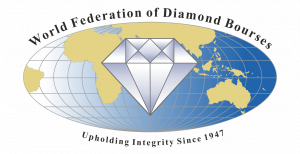
Day 2:
Antwerp: The topic of financing, which is crucial to diamond manufacturers and traders, was discussed in great depth on the second day of the 37th World Diamond Congress in Dubai on Wednesday. The issue of funding for the diamond sector was addressed with transparency and sustainability in mind, two of the themes of the Congress along with responsibility.
The morning session started with a presentation by Geert van Reisen of ABN Amro Bank, the global diamond industry’s leading financier. He stressed the need for the diamond business to improve working capital and reduce the manufacturing cycle time, while increasing its focus on collecting receivables, inventory management and payment terms. He added that the industry, especially in Antwerp, would benefit from having more banks involved other than those in India. There is also a need to look for alternative funding institutions, such as pension funds, insurance companies, and other international banks. The industry needs to change its operating model, shorten payment terms for rough and credit terms for polished and put a bigger focus on inventory management and lowering inventories.
He was followed by Howard Davies, the Head of Commercial Development at De Beers, who spoke on financing options and requirements for the diamond industry. Because diamonds are portable and rapid cross-border transactions were possible and many family businesses were involved along together with the number of bankruptcies due to bad debts in recent years, it would be difficult for the banks to see the sector as low-risk. The banks were also under pressure due to the massive fines that some have paid for non-compliance issues. Consequently improved industry transparency is critical. “Banks want to finance quality assets,” he commented. “Transactions must all be real with real clients and real invoices. Sustainability multiplied by transparency equals bankability.”
Panama Diamond Exchange President, Mahesh Khemlani, formerly Panama’s Deputy Minister of Finance, spoke about his country’s efforts to create transparency by passing anti-money laundering legislation. He also commented that the vast majority of the companies mentioned in the ‘Panama Papers’ were not Panamanian. “Tax evasion is a global problem not just Panama’s. Panama wants to be part of the solution to global tax evasion. We are working with the OECD to fight this. We are not a place for parking cash to avoid tax,” he said.
The next speaker, David Bouffard, Signet Jewelers Vice President of Corporate Affairs, spoke about the firm’s sourcing protocol. He said Signet is the biggest jeweler in the United States, and buys $1 billion of polished every year. “We want to know where the diamonds are coming from and who touches them along the way.” He said Signet is committed to responsible sourcing in terms of the suppliers it works with. He added that the company has mapped 99 percent of its gold supply and believes that understanding where its diamonds were from was also possible.
A panel discussion followed featuring Bouffard, Davies, Khemlani, van Reisen and Feriel Zerouki the Head of Government and Industry Relations at De Beers, who described the transparency across all operations that the miner has been requesting for the past 10 years and its Best Practice Principles which were ultimately aimed at increasing consumer confidence. Meanwhile, Bouffard said that responsible sourcing is a “must-have issue not a nice-to-have option.”
Day 3:
The 37th World Diamond Congress in Dubai concluded on Thursday, with a press conference for local and international journalists summarizing the issues that were addressed. The biennial meeting of the World Federation of Diamond Bourses (WFDB) and the International Diamond Manufacturers Association (IDMA) spent three days taking an in-depth view of the issues affecting the global diamond sector under the themes of ‘Transparency, Responsibility, Sustainability’.
“I was delighted with the attendance at the Congress with every session being full and the interest and seriousness shown by the many delegates, along with the quality of the speakers,” said WFDB President Ernie Blom. “We covered a huge amount of ground and were able to have very lengthy and profound discussions. It is critical that we hear global perspectives and the views of all members of the diamond pipeline and feed them into our comprehensive implementation programme.
“The WFDB in its working sessions also enjoyed the opportunity to discuss the factors that are impacting our bourse members. The bourse presidents and members of their delegations were fully engaged in the debates on issues including financing, price lists, synthetics, the policy of producers, tenders and much more.
“The Congress also saw promising progress in the development of our international Young Diamantaires group. These are members of the younger generation of diamond firms from all the main diamond centres, including Israel, India, Belgium, the United States and South Africa, who are taking responsibility for taking on the challenge of leading our industry in the future. I am delighted that we have young people who are bringing their specific generational skills and outlook into the industry,” Blom added.
Meanwhile, the WFDB also said that it recognizes the importance of increasing transparency and integrity in the global diamond supply chain in order to boost consumer confidence in diamonds. “We are proud that the global diamond business is one of the best regulated industries in the world, and we have been at the forefront in proactively seeking to ensure that this continues. Our members work according to wide ranging rules and regulations that ensure that diamonds are totally free of any possible suspicion, including U.N. resolutions, the Kimberley Process national legislation, antimony laundering regulations, Know Your Customer programmes and the WFDB Code of Conduct and chain of warranties requirements,” Blom explained.
“The WFDB would like to put on record that it respects the right of diamond companies to make agreements and implement protocols with other parties, and that, together with the WFDB’s rules and regulations that our members stringently follow, we are striving to guarantee a transparent supply chain. Furthermore, the WFDB is in ongoing communication with its affiliated diamond bourses to implement and enforce all relevant rules and regulations,” he added.
The WFDB agreed that the next Presidents Meeting in 2017 will be hosted by the Bharat Diamond Bourse, while the 38th World Diamond Congress in 2018 will be hosted by the Israel Diamond Exchange.



